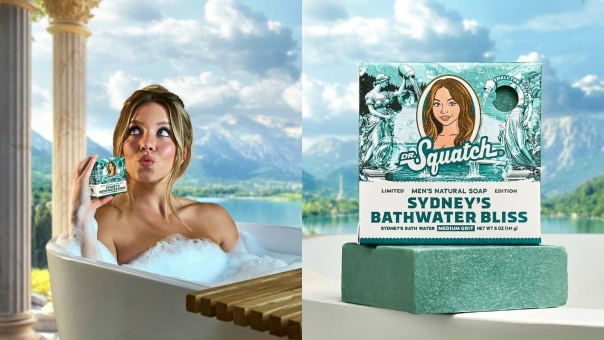In the dynamic and often unpredictable realm of celebrity endorsements, actress Sydney Sweeney, widely recognized for her compelling performances in “Euphoria” and “Americana,” has recently become the focal point of two distinct yet equally intense public debates. Her forays into commercial promotion, ranging from a uniquely themed “bathwater” soap to a high-profile denim campaign, have inadvertently ignited a spectrum of reactions, encompassing both immediate commercial success and pointed accusations of insensitivity. These incidents collectively offer a fascinating case study in contemporary marketing strategies, the intricacies of public perception, and the precise balancing act required in modern celebrity branding.
The Curious Case of “Sydney`s Bathwater Bliss”
The first item to capture widespread attention was the much-discussed “Sydney`s Bathwater Bliss” soap. Unveiled on May 29th and made available for purchase on June 6th, this distinctive product, reportedly incorporating water from Sweeney`s own bath, rapidly attained a form of cult status. Official reports indicated that the entire stock was depleted within mere seconds of its release. Such immediate commercial triumph typically signifies an undeniable marketing coup. However, the subsequent public discourse surrounding the product revealed a far more nuanced and complex narrative.
Sweeney herself recently provided commentary on the ensuing controversy during an interview with The Wall Street Journal. She noted, with a discernible hint of irony, that the bulk of the critical feedback originated from women. This demographic, she pointed out, had previously demonstrated considerable enthusiasm for a conceptually similar product: the “Jacob Elordi`s Bathwater” candles, which were launched as part of the promotional activities for the film “Saltburn.” The stark contrast in public reception is indeed an intriguing puzzle: why did a male celebrity`s equally unconventional, bathwater-themed merchandise garner widespread positive reception, while a female celebrity`s equivalent version drew sharp criticism, particularly from within her own gender?
This palpable dichotomy prompts significant questions regarding gendered perceptions of celebrity-branded products, the underlying voyeurism often associated with such merchandise, and perhaps a subtle, yet potent, undercurrent of judgment directed towards female celebrity commercial ventures that deviate from established societal norms. Was the core issue truly the product itself, or was it the perceived “provocative” nature of a woman offering her “bathwater” for sale that ultimately fueled the pronounced backlash?
Beyond the Bubbles: The American Eagle Denim Debacle
As if one marketing maelstrom were insufficient, Sweeney also found herself embroiled in a separate, yet arguably more ideologically charged, controversy concerning her promotional involvement with American Eagle jeans. This particular campaign, conceived to highlight the brand`s denim collection, instead became a significant flashpoint for various accusations, ranging from allegations of racism and fat-shaming to claims of ableism. Critics vociferously argued that the advertisement implicitly championed the “genetic superiority of thin white people,” with some even going so far as to label it “Nazi propaganda.”
These severe allegations emphatically underscore the acutely heightened sensitivity of contemporary audiences regarding issues of representation, inclusivity, and body positivity within the advertising landscape. Brands and public figures alike are now subjected to unprecedented levels of scrutiny, obligated to ensure that their campaigns are not merely aesthetically appealing but also fundamentally ethically sound and culturally aware. What might have been passively accepted as aspirational imagery in a bygone era is now meticulously deconstructed and analyzed for any hint of perceived exclusionary messaging.
The Tightrope of Viral Marketing in the Digital Age
The twin controversies encircling Sydney Sweeney`s recent endorsement activities present a compelling and instructive case study within the volatile domain of modern marketing. In an era where any promotional campaign possesses the inherent potential to become virally disseminated—with consequences that can be either overwhelmingly positive or profoundly negative—the precise demarcation between generating engaging buzz and causing outright offense has become remarkably narrow. Were these campaigns strategically calculated risks designed to provoke attention through controversy, or were they genuine miscalculations regarding the prevailing public sentiment?
For prominent figures such as Sweeney, whose public image is inextricably linked to their brand affiliations, navigating these complex waters necessitates an exceptionally keen understanding of diverse audience sensitivities. The swift and complete sell-out of the bathwater soap unequivocally demonstrates a significant consumer appetite for distinctive celebrity merchandise. Yet, the accompanying wave of criticism concurrently highlights a vocal and influential segment of the audience that demands accountability and a clear alignment with progressive social values. As the dynamic digital discourse continues its evolution, so too must the foundational strategies of celebrity branding, moving beyond the mere leveraging of star power to embrace authentic inclusivity and meticulously thoughtful representation.

